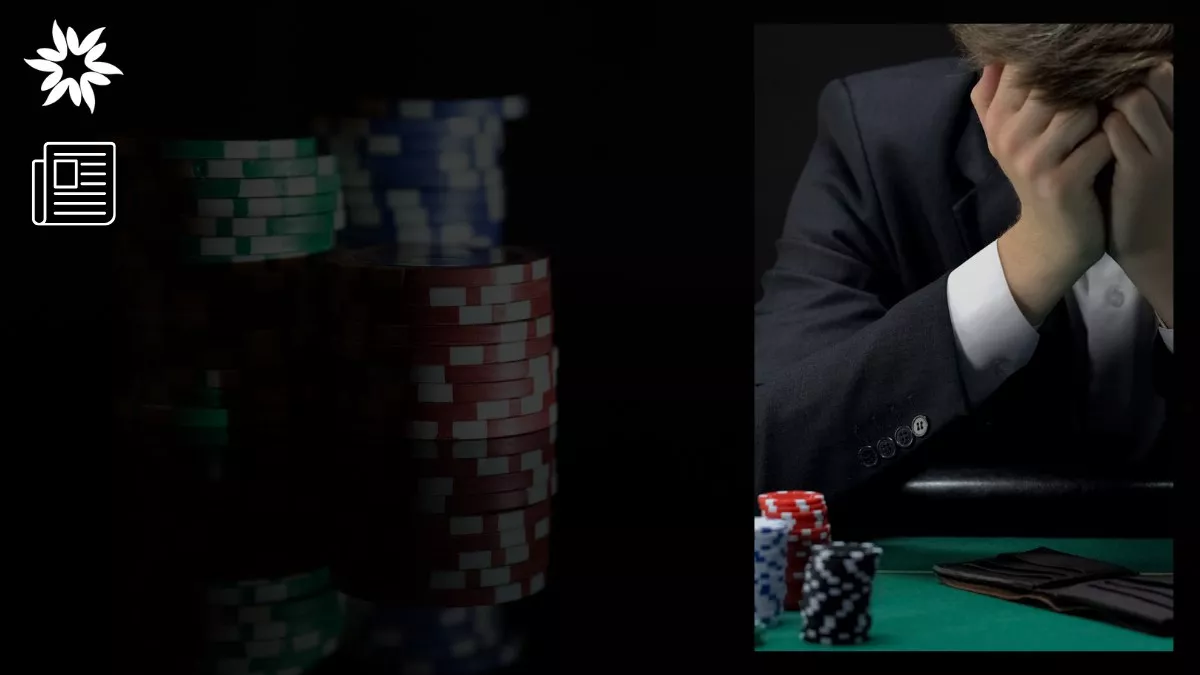A bad bet doesn’t just drain a gambler’s wallet — it drains everyone around them.
When a dad has a gambling addiction, it not only exhausts his bank accounts but also affects his family, other relationships, and mental health.
According to the National Council on Problem Gambling (NCPG), an estimated five million Americans struggle with compulsive gambling, yet only about 8% seek help.
That leaves millions of families dealing with missed mortgage payments, secret credit card debt, and drained savings when gambling turns into a problem.
So, who really pays the price? The spouse? The kids? Taxpayers? Let’s find out.
How Much Does the Average Gambler Lose?
Gambling often starts with small bets, fueled by the excitement of winning.
When losses add up, the stakes get higher. Instead of quitting after a major loss, they continue chasing the money, convinced the next win will fix everything.
They eventually turn to credit cards, personal loans, or even borrowing from friends and family. Some gamblers even borrow money from illegal loan sharks, which further puts their safety at risk. This vicious cycle leads to crushing gambling debt loans.
Studies estimate that the average gambling debt is about $42,750, though for some, the damage is even worse.
Beyond personal debt, a gambling addiction frequently leads to financial crimes. Embezzlement, fraud, and theft from employers become common when debts grow too high.
Who Bears the Costs of Gambling Addiction?
So who pays up when dad takes out multiple high-interest gambling loans, maxes out credit cards, or gambles away retirement savings?
Let’s take a look.
Families
When a father struggles with a gambling addiction, the family feels the immediate and most severe impact. For many families, the first sign of trouble isn’t a confession. It’s a missing rent payment, a sudden dip in grocery money, or an unexplained loan.
Essentials like food, utilities, and school expenses start to feel like luxuries.
The ripple effect only grows from there. Disposable income, once used for family outings, birthday celebrations, or just a spontaneous treat, vanishes almost overnight. Suddenly, the household budget becomes a constant source of stress.
When one partner gambles away money, the other often has to compensate. A spouse may take on extra shifts, juggle multiple jobs, or start selling personal belongings just to pay the bills and gambling debt. Older children might feel pressure to pitch in financially, whether that means postponing college or taking on jobs to contribute to household expenses.
While money is the most visible cost, it’s not the only one.
According to the Diagnostic and Statistical Manual of Mental Disorders, gambling disorders can also cause restlessness, frustration, stress, and depression. These symptoms lead to frequent arguments, strained relationships, and emotional distance between couples.
Beyond immediate financial struggles, a gambling addiction can also ruin a family’s long-term stability. A father with a history of reckless betting may lose access to credit, making it impossible to qualify for a home loan or even a car lease.
If the addiction escalates to job loss, the family may be forced to downsize their home or relocate.
A child’s education fund may vanish, altering their college choices or eliminating them altogether. Retirement savings meant for a secure future may be drained, forcing a spouse to work years longer than planned.
Welfare System
With financial collapse, families that once had a stable income may suddenly find themselves relying on government assistance just to meet basic needs.
Programs like food stamps (SNAP), housing assistance, and cash aid (TANF) often provide a safety net for struggling families. Still, some families may find themselves bouncing from shelter to shelter, while others lean on local charities or food banks just to get through the month.
In severe cases, when a parent’s addiction leads to neglect, children may end up in the foster care system. However, the cost of foster care, court proceedings, and social services intervention falls squarely on taxpayers — another hidden price of gambling addiction.
Insurance Companies
Gambling disorder can affect mental and physical health. Individuals struggling with gambling addiction often experience anxiety, depression, and even suicidal thoughts.
The stress of excessive debt and family breakdown can drive them to seek therapy, psychiatric care, or even hospitalization. Out-of-pocket costs for gambling addiction treatment can range from $50 to $500, making it inaccessible for many.
However, if you’re insured through AETNA, Blue Cross Blue Shield, CIGNA, OPTUM Health Services, or a government program like Medicare or Medicaid, you might qualify for partial coverage.
Most plans cover around 60% to 80% of expenses, but the exact amount depends on your provider and policy. Some insurers may also have strict requirements, so it’s worth checking the details, as even with insurance, copays and deductibles can still add up.
Is Treatment the Answer or Just Another Expense?
Once a person is addicted to gambling, it can be quite difficult to break this unhealthy cycle.
However, different treatments can help an individual regain control and get out of gambling debts. This includes:
- Rehab: Inpatient rehabilitation provides a controlled environment where individuals can focus solely on recovery. These programs offer therapy, financial counseling, and relapse prevention strategies, but they don’t come cheap. A 30-day stay can range from $5,000 to $20,000, which may not be feasible for families with excessive debt.
- Counseling: Counseling provides a more flexible option that may be easier to fit into a busy schedule. Individual therapy sessions focus on identifying the root causes of the addiction and developing healthier coping mechanisms. Sessions typically cost between $50 and $250 per hour, which might be high yet still manageable for some.
- Group Therapy: If a person can’t afford private counseling, group therapy offers a lower-cost or even free option. Gamblers Anonymous (GA) provides peer-led support meetings at no charge, following a 12-step recovery model to regain control.
- Online Resources: There are also numerous online resources and self-help tools available at little to no cost. Websites, forums, and apps provide education, support, and coping strategies that can complement formal therapy or serve as an initial step toward recovery.
It’s natural to be concerned about the costs of these treatments. But when looking at the bigger picture, the expense of treatment is often a worthwhile investment.
Different Policies for Gambling Prevention and Financial Safety
While the gambling industry generates billions in revenue, the government reserves a portion of that money for prevention, education, and treatment.
One major initiative in the U.S. is the National Council on Problem Gambling’s GRIT Act, which allocates half of the federal sports excise tax revenue toward gambling addiction prevention and treatment programs.
In various regions, government-backed services like Gambler’s Help provide free and confidential support for both gamblers and their families. Unlike private therapy, these services are publicly funded, making them accessible to those who can’t afford treatment on their own.
If a person is aware of his excessive and unstoppable gambling habits, self-exclusion programs offer a way to prevent relapse.
Individuals can voluntarily place themselves on a self-exclusion list, which bans them from gambling at casinos, online betting sites, or other regulated gambling establishments. This way, they won’t be able to drain their account and suffer a financial fallout.
So, Who Covers the Losses?
When the bets stop, the bill remains. While families often take the financial hit, taxpayers and insurance providers also bear the burden.
Despite government programs and insurance coverage, many still struggle to find affordable and effective treatment.
The only solution is to gamble responsibly and reach out for help before debt, addiction, and loss take over.








